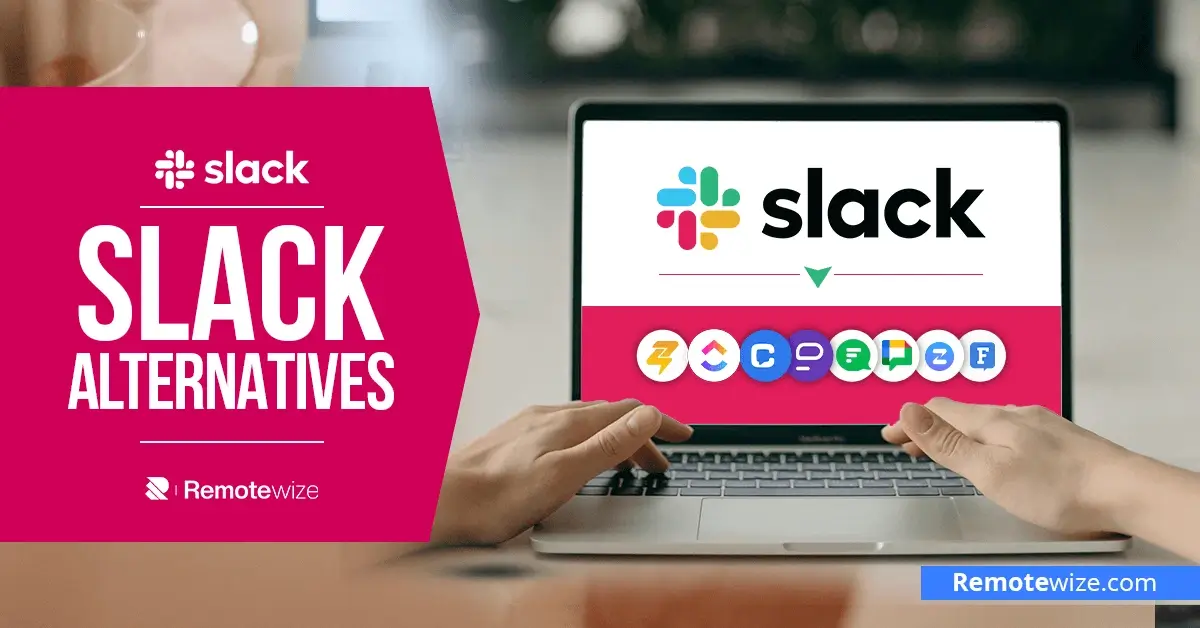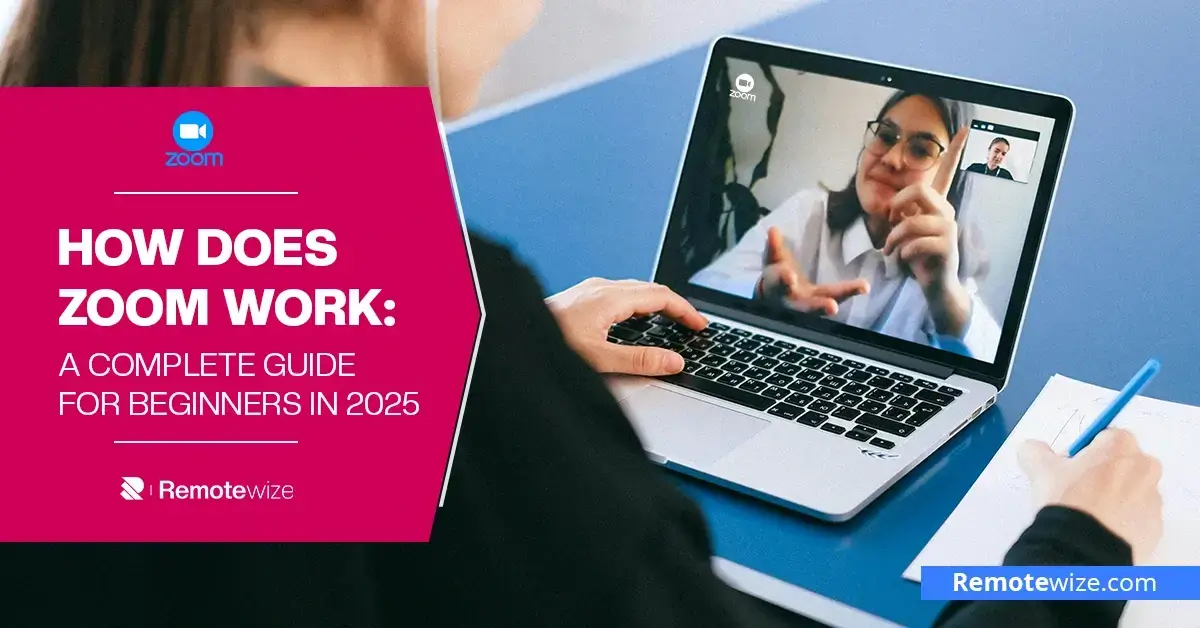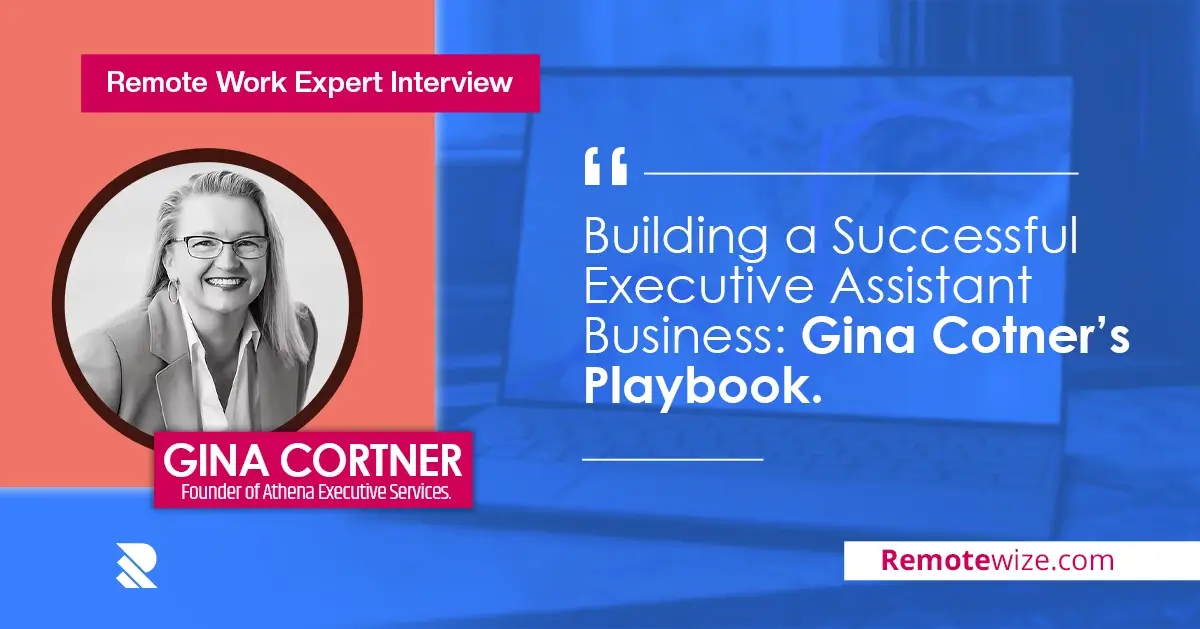Top 11 Slack Alternatives You Need to Try in 2026
Switching from Slack due to high costs or looking for the best Slack alternative? This guide is for you. I compiled a list of the top 7 Slack alternatives with powerful communication features at a fraction of the cost.
ClickUp Review 2026: What We Learned After 12+ Months of Real-World Use
I’ve spent months testing every ClickUp feature to see if it truly lives up to the hype. From task management and time tracking to ClickUp Brain and automations, here’s my honest, hands-on take on what works — and what doesn’t.
How Does Zoom Work: A Complete Guide For Beginners in 2026
Discover how Zoom works in 2025 with our ultimate beginner’s guide. From setting up meetings to mastering key features, unlock the secrets to seamless video calls and virtual collaboration. Don’t miss out — start today and Zoom like a pro!
Building a Successful Executive Assistant Business: Gina Cotner’s Playbook
Looking to scale a remote EA business? Gina Cotner shares the lessons, tools, and culture-first mindset that made Athena a success.
How to Kill Information Silos in Remote Teams: Lessons from a Microsoft 365 Innovator
See how Katya Linossi, Co-Founder and CEO of Atlas by ClearPeople, helps remote teams reduce information silos, boost collaboration, and stay in sync with Microsoft 365.
Free Slack Alternative: Top 7 Tools To Power Up Your Team For $0
Frustrated with Slack’s 90-day message limit or missing key features on the free plan? Read this guide to discover the best free Slack alternatives that keep your chat history and boost collaboration without breaking the bank.
Communication Overload: How to Manage Notifications Fatigue in 2026
Struggling with disengaged employees, repeated questions after meetings, or cameras off in virtual meetings? These could be signs of communication overload. Read on to discover how to spot and fix hidden communication overload symptoms!
5 Best Websites to Hire Software Developers in 2026
In 2023, the fast-paced world of technology continues to flourish, and with it, new startups emerge by the day. This highlights the ongoing need for high-quality software developers to help these firms grow and innovate. According to the United States Bureau of Labor Statistics, the overall employment for software developers is projected to grow 26% from 2021 to 2031, indicating the sector’s growing demand.
Are you on a quest to find a software developer? Look no further. This post explores platforms that can help you identify developers in search of new possibilities. Continue reading to find out how you can attract top talent and spur the growth of your technological initiatives.
5 Best Websites to Hire Software Developers
Hiring the right developers is crucial to the success of your organization, and the process does not have to be strenuous. Here is a curated list of the top 5 websites that can help you find software developer for your startup:
1. Toptal

Pros:
- Premium Talent: Toptal’s thorough screening procedure ensures access to a network of exceptionally talented software developers, ensuring quality expertise.
- Personalized Support: Toptal’s committed team works with clients to identify the best software developers for their project needs.
- Reliability: Due to its distinctive model, businesses can quickly add to or build new project development teams without running the risk of hiring mistakes.
Cons:
- High Cost: Compared to other options on the market, Toptal’s services are more expensive because it is an upscale talent platform.
Toptal Pricing: Toptal has a $500 initial deposit requirement for recruiters. When you hire someone, this will be credited to your initial invoice. Your deposit will be fully reimbursed if you decide not to proceed.
For access to top-tier software developers, Toptal is the ideal destination. One outstanding feature about this platform that makes it stand out is that it rigorously screens all candidates, ensuring you get a pool of the top 3%.
Toptal was initially meant solely for independen
How Toptal Works
Candidates interested in joining Toptal must undergo a screening process to assess qualifications. The screening procedure is as follows:
- A full interview covering language, personality, and communication.
- A technical interview in which the candidate’s talents, cognition, and problem-solving abilities are evaluated.
- Every applicant goes through live tests to assess their specialized skills within the key expertise field.
- Every applicant is given a test project that is a real-world issue and has one to three weeks to complete it.
At the end of the screening stage of the hiring process, only the top 3% of candidates are accepted. When you use the platform when hiring software developers, you won’t have to fiddle around reviewing the candidate’s skill set because they have already been verified to have a decent track record.
Recruiters can submit job specifications on the
2. Arc.dev
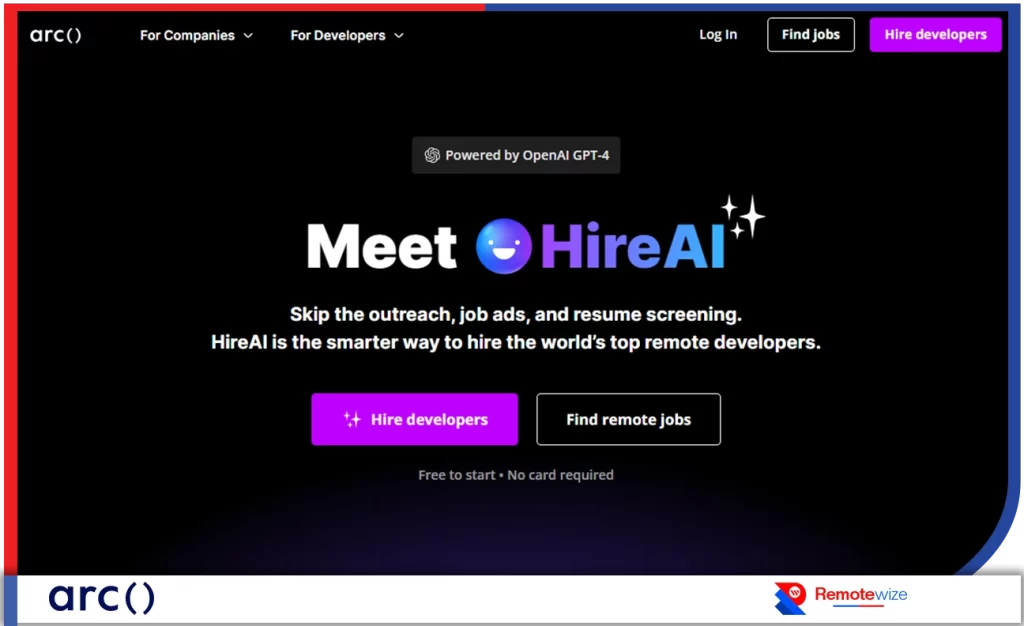
Pros:
- Elite Talent Pool: Arc.dev has a meticulously selected talent pool of developers, providing access to top-tier experts when hiring freelance software developers.
- Thorough Assessment: The platform employs an elaborate technical assessment procedure to gauge the knowledge and abilities of developers.
- Supports Scalability: Arc.dev allows employers to recruit candidates for long-term positions, allowing them to scale effectively over time.
Cons:
- Smaller Talent Pool Base: Due to Arc.dev’s rigorous screening process, there may only be a small pool of developers available, especially for specialized skill sets.
Arc.dev Pricing: Hourly rates for freelance developers start from $60 and can go upwards to $80.
Arc.dev is an excellent resource if you are searching for highly skilled and qualified freelance developers. Software developers, DevOps engineers, full-stack developers, and database managers comprise a few of these freelancers’ specialities.
Like Toptal, Arc.dev has a rigorous review procedure that makes use of assessment tools to guarantee high standards. It is dedicated to enabling businesses to employ full-time, remote engineers for the longer haul, which is ideal for businesses looking to scale their long-term projects.
How Arc.dev Works
Arc.dev provides a straightforward hiring process. Reach out to the Arc.dev team to convey your request. Describe the Arc developer you are looking for, outlining your desired qualifications, skillset and experience.
You will receive vetted applicant profiles that match your engineering requirements. These professionals have already been taken through interviews, coding assessments, and reference checks to ensure they meet your standards. Invite them for an interview, conduct assessments, and hire when you find a match.
3. Indeed
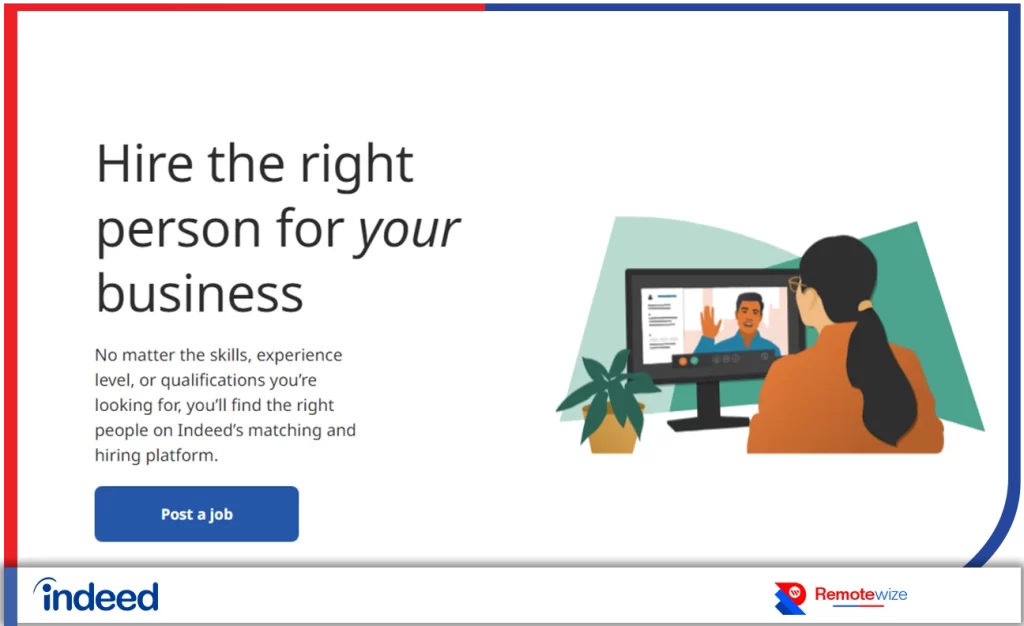
Pros:
- Huge Talent Pool: Indeed has a large user base, providing access to a diverse choice of software developers with varying talents and skill sets.
- International Reach: Employers can hire software developers worldwide because the platform has an international scope.
- Budget-Friendly Alternatives: Posting job advertisements on Indeed is inexpensive, making it ideal for businesses with restricted recruitment budgets.
Cons:
- Screening Difficulties: The large number of applicants to Indeed job posts can make screening tedious and lengthy.
Indeed Pricing: Free to post jobs. Paid listings are available if you want to sponsor your job post.
Indeed is a leading job posting website globally, with more than 300 million unique visitors monthly. It has built a reputation as a platform that connects job seekers to work opportunities in different categories.
Individuals seeking jobs can post their resumes, boosting their chances of acquiring positions in different companies. This platform also doubles as a social network where different parties share their opinions and takes on their professional lives.
How Indeed Works
Indeed allows you to post a free or paid job listing (Sponsored Job). When you make a free job post, it will appear in the relevant candidates’ search results. This job post will, however, drop off as new positions are posted.
On the other hand, paid jobs are shown in search results for the duration they are sponsored. This makes them visible for an extended amount of time and to a larger number of potential employees.
Furthermore, you will only pay for high-quality applications that satisfy your minimum requirements. Interested candidates can apply to your job posts, after which you can vet and interview them to find the ones that suit your specific company needs.
We have a full guide on how to screen and vet software developers, but if you’re looking for inspiration Andrew Jernigan — CEO at Insured Nomads — has got you covered. This is what Andrew had to say about software developer interviews:
As a fully remote team, we only do video calls and interviews. In this case, we went through 3 stages of interviews – Initial Screening, Meeting with the senior leadership, then Onboarding and Offer Negotiation.”
4. GitHub
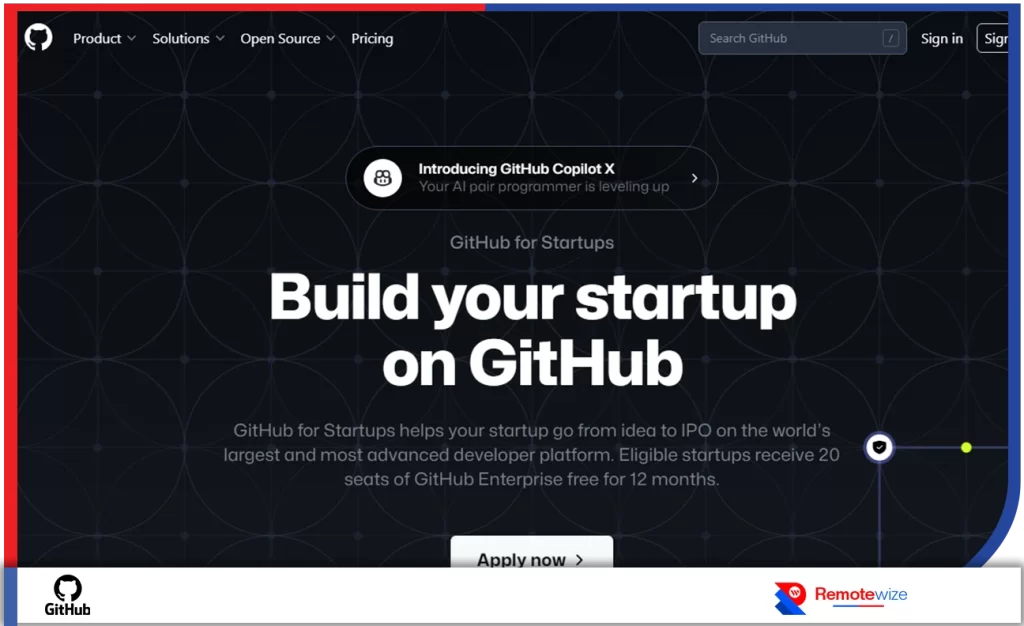
Pros:
- Provides a Community of Developers: GitHub has a considerable developer community, rendering it a perfect platform for businesses looking for employees within that field.
- Credibility: Developers regard GitHub as a trustworthy platform that can attract top talent and boost the likelihood of discovering experienced and qualified applicants.
- Added Advantage: GitHub is an excellent site to find engineers familiar with Git. Git is a popular version control system. It is a great tool for collaborating with other developers and tracking code changes.
Cons:
- Time-Consuming: You’ll have to devote a substantial amount of time to this platform to figure out how it operates when recruiting. It is not as straightforward as publishing a job listing on a dedicated job board or social media.
GitHub Pricing: GitHub free is available to all users. There are paid plans available for access to more features and functionalities.
GitHub is the most extensive online developer community. GitHub Jobs, best known for its collaboration features and version control, is an ideal platform for organizations to interact with highly qualified developers.
Developers on the site share and review code, run projects, and develop software. With over 100 million developers utilizing the platform, it provides a terrific channel to recruit developers for your company.
How GitHub Works
To leverage GitHub for talent acquisition, you must first create an account. The next step is to run a search, which needs you to factor in a few things. These include the followers, language and location of potential candidates.
Regarding followers, a developer’s quantity of followers is a good indicator of their expertise, skill, and reputation on the community platform. When it comes to language, look at the language they code in and evaluate whether it matches your company’s project needs. Unless you are hiring for a remote position, the candidate’s location will also be a key parameter in your decision-making.
With these criteria in mind, enter your query on the GitHub search bar, and filter the results to users. You can then sort out the results to find potential candidates that align with your requirements.
5. Gun.io
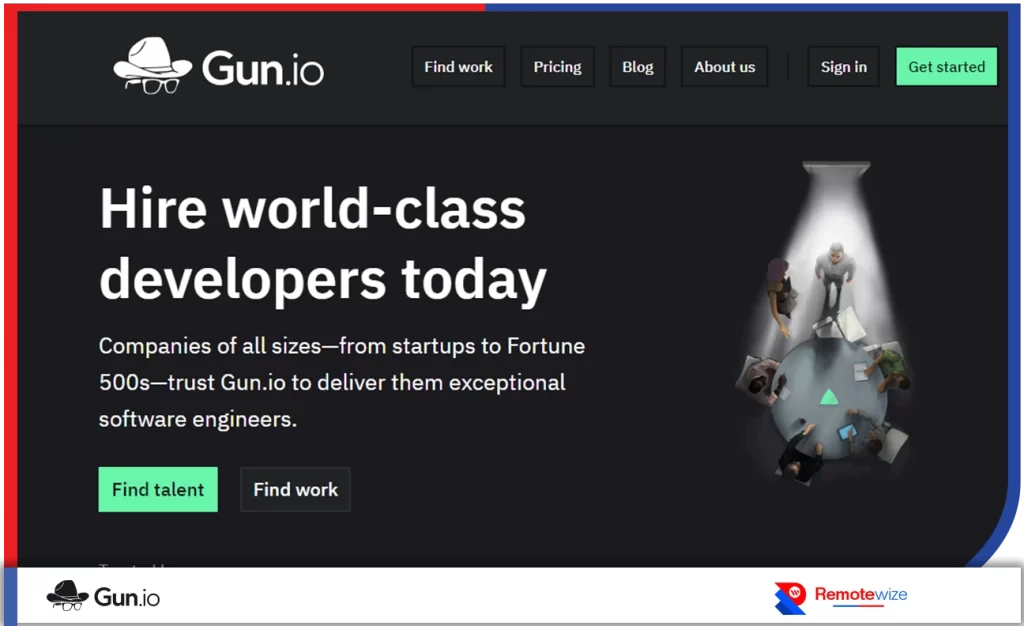
Pros:
- Exposure to Top Freelancers: Gun.io provides access to premium freelance developers.
- Quality Assurance: The platform provides exceptional talent by putting freelancers through a thorough screening procedure depending on their skills and expertise.
- Fast Hiring: Gun.io provides employers with a quick solution to their recruitment needs by allowing them to find talent within 4 days on average.
Cons:
- Mandatory vetting for clients: To post a job on Gun.io, clients must apply and be vetted first. Once approved, the Gun.io team posts the job on their behalf.
Gun.io Pricing: Gun.io has freelance contracting and direct hire options for recruiters. Freelance contracting is on a retainer basis based on the project, while direct hire is charged 20% of the candidate’s first-year salary.
Gun.io is a platform that connects organizations with both freelance software engineers and long-term employees. The team thoroughly vets each freelancer to guarantee that only the top candidates become available for hire.
All the software developers who apply to join the platform undergo algorithmic screening and a work history and background check. The last stage of the hiring process involves a live technical interview by an expert in the field. From the massive number of applications sent in, only a few get approved to work with clients.
How Gun.io Works
Gun.io also conducts a vetting process for interested clients to maintain the platform’s high standards. This means you must apply and be approved to post a job. It is also important to note that clients do not post their jobs directly on the website; the Gun.io team does it on their behalf.
Its operations team handles all payments between you and the professional, while its customer support staff assists you in hiring. Once your job is posted, you can interview in
s you in hiring. Once your job is posted, you can interview interested candidates to find the ones that fit your needs.
Top 4 Alternatives to Developer Job Boards
Job boards are a resourceful avenue to access and hire software developers. However, given the competitive nature of the job market, exploring other alternatives can broaden your chances of tapping into top talent. Here are some job board alternatives you can give a shot:
Ask Employees For Referral
Referrals are among the most effective ways to find top-notch software developers if you choose not to go the job board route. You can get referrals from your employees or other key industry players in software development.
There are multiple advantages to using referrals to find potential candidates. First, the likelihood of a referred candidate being a good fit is high. This is because the referrer understands what your company operates in and your project scope. They, therefore, only provide relevant options.
Another advantage is that it helps you cut down on recruitment costs significantly. Instead of spending your resources advertising your job opening, you can simply acquire candidates with the necessary skills directly through referrals.
Share Job Opening On Social Media
Social media is another convenient channel you can utilize in talent acquisition. Publishing your job openings on social media can help you access a wider audience when hiring software developers. Platforms like LinkedIn, Twitter, and Facebook have expansive networks that allow quick sharing and dissemination of job posts among professionals.
Include your job description and requirements when creating your social media job post. You can also encourage your networks to share the posts to help you attract more software developers to choose from.
“We post our job ads on our website, on Angel List, and occasionally on other free job posting sites. We also utilize our social media accounts and those of our core team to publicize job opportunities within our personal networks.”
~Danny Nathan, Founder/CEO at Apollo 21
Networking at Online Tech Events
Networking has been an excellent strategy for connecting with experts in various domains since time immemorial, and the tech sector is no exception. In today’s world, networking has moved from traditional offline events to virtual conferences, webinars and online tech events. These events allow developers, experts, and tech enthusiasts to meet and establish meaningful professional connections.
Participating in such events opens you up to relevant and qualified software developers who provide a pool of potential talent for your company. You can communicate that you have a job opening as you engage with other attendees and then follow up with interested candidates after.
Software Developer Communities
Online and offline software development communities serve as active centers for developers to interact, share information, and support one another. Participating in these forums can provide useful insights into the current industry trends, access to experienced professionals, and networking possibilities.
Participating actively in physical events can offer your organization visibility, helping you connect with skilled developers in your vicinity. You can participate in online forums such as offering advice and exhibiting competence.
Online platforms are especially useful for remote positions. As per the 2021 Developer Survey by Stack Overflow, the majority of the globe’s software developer population (60%) is concentrated in ten countries. The United States and India continue to top the world in software developer populations (18.33% and 12.61%, respectively).
How to Write a Compelling Developer Job Post
A compelling job post is crucial to attracting top candidates. Your post must be informative and geared towards the right audience, software developers. Follow these steps to create an effective job post:
1. Create a Concise Job Title
Begin with a job title that is clear and concise and accurately reflects the position you are hiring for. Ensure the title does not leave room for misrepresentation to attract the right candidates.
An example of a clear title would be “Full-Time Senior Back-End Developer.”
2. Provide a Comprehensive Job Description
Provide a detailed job description with an overview of the project details, the developer’s responsibilities, technical skills required, necessary experience, and other qualifications. Be precise about unique skill sets, such as experience with specific industry domains. According to Statista, 19% of developers worldwide have 1-4 years of experience, and 29% of developers have spent 5-9 years coding.
3. Include Relevant Keywords
Keywords are essential to any job post, which applies to any software developer job post. Including relevant keywords ensures your post becomes available to relevant candidates, making it easier to match expertise and qualifications. This is especially useful for job boards, as potential candidates can filter job openings more efficiently based on keywords.
4. Specify Application Instructions
Outline how candidates can apply for the job, including any requirements like resumes, cover letters, and code samples.
5. Proofread and Publish
A properly-written and error-free post reflects your company’s professionalism and competence, so edit your post. You can post it on the relevant platform after verifying that it has no grammatical errors.
Begin Your Search For a Software Developer Today
Talent acquisition for the best software developers does not have to be an aggravating hiring process. With multiple channels, you can leverage different platforms to find candidates matching your company’s needs.
Explore the alternatives available, such as online platforms, referrals, networking events and industry communities, to broaden your reach. By diversifying your recruitment strategies, you can attract exceptional web developers to take your organization to the next level.
Find Software Developer: FAQs
How Do I Find a Good Software Developer?
Leveraging various channels will help you find a good software developer. This can include browsing job boards, accessing industry-specific communities, checking professional networking sites and asking for referrals.
How Do I Find Software Developers Online?
To find software developers online, it is recommended that you explore popular platforms that have built credibility, connecting employers to professionals. These include Toptal. Arc.dev, GitHub, and Gun.io.
How Do I Find and Hire a Software Developer?
Adopting a systemic approach of thorough evaluation will help you find and hire a qualified software developer. This begins with you defining the experience level, technical skills, and expertise that aligns with your organization’s needs and then evaluating whether potential candidates meet these metrics.
Where To Find Developer Candidates?
To access developer candidates, take advantage of online job boards and professional networking sites. Other potential avenues to find candidates include industry conferences, tech events and hackathons.
Screening Interview: Definition, Benefits and Best Practices in 2026
As Mary Krull — Lead Talent Attraction Partner at Southern New Hampshire University — opines, hiring remotely opens up the talent pool. More often than not, every job ad generates an overwhelming number of applicants. The question becomes, how do we whittle down the pool and proceed with high-potential candidates? Enters a screening interview.
Screening interviews enable you to separate the wheat from the chuff. They let you see through the buzzwords in the resumes and junk curriculum vitae (CVs) to weed out applicants who are bluffing. If you’re hiring remotely for the first time and don’t know how to conduct screening interviews, we’ve got you covered here.
In this guide, we’ll discuss everything you need to know about screen interviews. We picked the brains of renowned HR experts, and we’ll share their opinions throughout the article. Stick by as we discuss a screening interview, its purpose, best practices, and the best screening interview platforms.
What Is a Screening Interview?
A screening interview is the preliminary interview you administer to screen or filter job applicants. It’s the first and critical step in remote hiring that enables companies to narrow down their talent pool to retain those they think are best fit for the open position.
What Are The Most Common Types of Screening Interviews?
The most common types of screening interview are phone, video and questionnaire screening interviews. Let’s get into details:
1. Phone Screening Interview
A phone screening interview involves contacting potential talent through the phone. Generally, phone screening interviews are short and don’t require an investment in any interviewing platforms. For this reason, they are an excellent option for brands seeking to minimize hiring costs.
One notable drawback of phone screening interviews is that you can’t see non-verbal cues during the interview.
2. Video Screening Interview
Unlike the simple phone interview, a video screening interview allows you to assess the candidate’s body language. There are two ways of conducting a video screening interview.
One, you can request the candidate to record a video answering specific screening questions. Alternatively, you can conduct a live video screening interview through online screening apps.
Some of the best platforms for video screening interviews include Zoho Recruit, Zoom, Google Meet, and VidCruiter, among others.
3. Questionnaire Screening Interview
If the role in your organization requires an in-depth assessment of the candidate’s situational judgment, a questionnaire screening interview is a good option. Questionnaires involve screening interview questions, determining whether a candidate has specific skills required for a role.
How To Conduct A Screening Interview
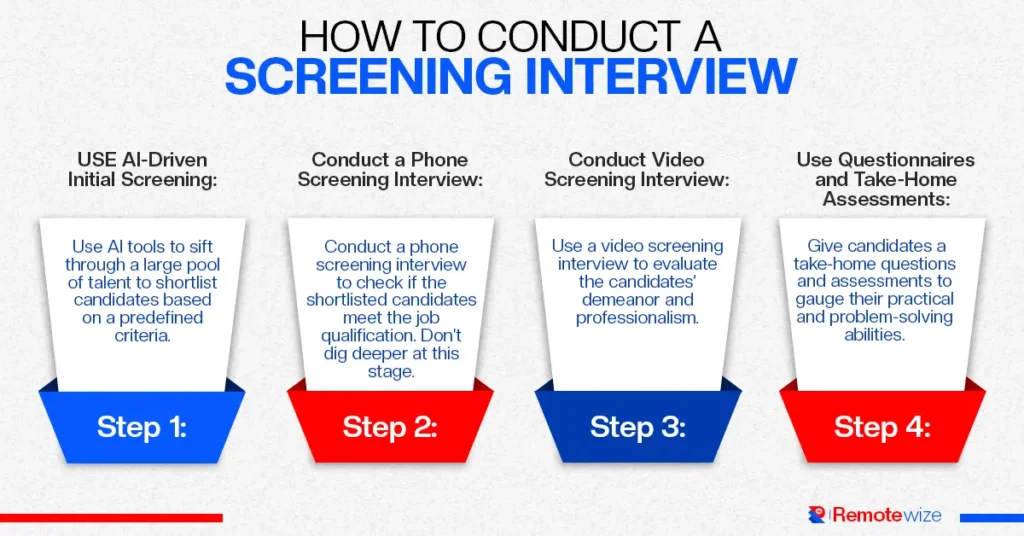
While you can choose a video or phone screening interview, we recommend taking a multi-faceted approach. An approach that blends the three screening methods enables you implement a more holistic evaluation. This allows you to pinpoint top talents while promoting diversity, inclusivity, and fairness in your hiring process.
Here is how to conduct a multi-faceted screening Interview:
1. Use AI-Driven Initial Screening
The advent of AI tools is a blessing and curse in equal measures for HR professionals. The proliferation of AI tools has made it possible for candidates to quickly put together applications that match the job description. As a result, you probably have to deal with a litany of junk CVs and applications.
Luckily, the same AI tools can help you sift out unhonest applications, before you even schedule a phone interview. Using AI tools for initial screening helps sift through a large pool to shortlist candidates based on specific criteria.
2. Conduct a Phone Interview
Start with a phone interview without video to mitigate biases and promote objective assessment. Jessica adds that the phone lets you evaluate each candidate based solely on their qualification and responses. Some of the things to check during a phone screening interview include:
- Communication skills
- Role fit
- Ability to articulate skills and experiences
- Overall suitability
3. Introduce Video Screening Interview
During the phone screening interview you spotted the right fit early and are certain those that sailed through have the potential to be your hire. However, these candidates aren’t yet ready for the main interview.
The video screening interview helps evaluate the candidates professionalism and demeanor. These are important factors for assessing the candidates cultural fit within a virtual team. Seeing the candidate on video also helps provide valuable insights into the candidate’s non-verbal cues.
4. Use Questionnaires and Take-Home Assessments
Lastly, give successful candidates take-home assessments to delve deeper into their preferences, experiences and cultural alignment. Questionnaires and assessments enable you to gauge the candidates practical skills and problem solving abilities.
Just bear in mind there’s no one-fits-all strategy when it comes to screening interviews. What works best for you is a strategy that can ensure the candidates that sail through to the main part of the hiring process have the requisite skills and resonate with the unique ethos of your organization.
What Is The Purpose of Screening Interview?
A screening interview isn’t a formality: it’s a critical step in the hiring process. Get it right and you’ll find the best talent for the role. But if you get it wrong, it won’t be long before you schedule another hiring round — wasting time and money. Here’s why you need to conduct a screening interview:
Streamline the Hiring Process
Screening interviews enables you to filter our applicants who may not be the right fit for your company. It helps you whittle down the applicants’ list to retain candidates who not only meet the requirements but also align with your company culture and values.
Besides saving time and money, screening interviews sets the stage for more structured and in-depth conversation in subsequent phases of your hiring process. Ultimately, a well-structured screening interview ensures you hire only the best talents.
Lower the Cost-Per-Hire
Hiring the wrong talent for a remote position can be costly. According to the Society for Human Resource Management, the cost of making a single hire is $4700. Depending on the seniority of the role, your company can spend up to four times the position’s salary to hire.
Conducting a good screening interview can help you get the right hire, sparing you the ache of wasting hiring resources.
Give Candidates an Insight About Your Organization
The recruitment process is not solely about you finding the best fit for a role. It is also about the candidate finding their best fit. During the screening interview the candidate gets accustomed to the company culture and mission.
Why is it essential for the candidate to get familiar with the organization? It is simple: working with an employee who owns the brand is better than one with the ideal skills but feels out of place. If you are looking for talent to grow with your brand, it’s crucial for them to feel they belong in the organization.
Common Screening Interview Questions
While screening interviews should be brief, the interview questions should help you comprehensively assess the candidates. You can choose to tailor the questions to your company. Below are some common interview questions:
- What are some of your previous achievements that align with this role?
- What drew you to our organization?
- What are your organizational culture expectations?
- Do you have a salary expectation? State the specific range.
- How do you plan to capitalize on this role to improve your skills?
- How do you handle conflicts at work?
- Does this position align with your long-term goals?
- Describe what you know about this company
- Why are you interested in a remote role?
- Describe your best quality that aligns with this job
- What are your expectations about this role?
- What are your passions and hobbies?
- What sets you apart as the idea talent for this job?
- Are you currently engaged in other interviews with other organizations?
- Which leadership style do you find most effective?
- How do you handle tight deadlines?
Best Video Screening Interview Platforms
1. Google Meet
Pros
- Free to use
- Intuitive and easy to use
- Easy meeting scheduling
- Visual effects and background options
- Features encrypted data
Cons
- No meeting recording feature
Google Meets enables flawless screening interviews through its high-quality video. It supports real-time interviews, enabling you to read the candidate’s non-verbal cues. Also, the high-quality audio allows uninterrupted interactions during the screening interview.
If you have set up some problem-solving challenges for candidates, you can use the screen-sharing feature on Google Meets. It also has a recording feature that can allow you to further assess the performance of candidates after the screening interview. Note that the recording feature is not included in the free plan.
Transcribed File After Screening Interview
Google Meets has an automated transcription feature, which automatically converts the screening interview into a written file. The transcription feature spares you the time for note-taking or the extra cost of transcribing the screening interview.
Google Meets has a free plan that effectively works well for small meetings. However the free plan only covers up to 24 hours for one-on-one calls. If you are trying to save on costs, you can use the free plan and upgrade later, depending on your needs.
2. Willo
Pros
- Pre-recorded questions
- Incredible support team
- Candidates can answer questions at their own pace
Cons
- No real-time interaction with candidates
Willo is the perfect tool for convenience. It ensures that the candidate and the recruiter have the screening interview without tampering with the regular schedule. Candidates can answer the screening interview questions at their own pace and convenience.
Recruiters can acquire talent from anywhere around the globe without struggling with timezone differences. Willo is tech-friendly and has excellent automated features. For example, the tool can automatically share screening interview links on any platform.
Get a Background Check For Candidates
Hiring remote talent can be stressful because of scammers and frauds. Willo eases such stress through the unique background-checking feature. You can receive a report verifying the candidate is who they say they are, hence avoiding hiring impersonators.
Willo has affordable plans starting from $68/month. The tool offers a 15-day free trial with no strings attached.
3. Zoom
Pros
- Screening interview on Facebook
- Easy to use
- Perfect for large meetings
Cons
- Inability to control unwelcomed comments
Zoom provides an easy-to-use platform that makes screening interviews convenient for both the recruiter and the candidate. It offers high-quality video and audio that minimizes interruptions during the interview session.
Zoom has virtual background features that allow you to create the right environment for a screening interview from any site. It also features top-notch security to secure the screening interview and enhance privacy.
Divide a Large Pool of Candidates Into Smaller Groups
Zoom has a unique feature called breakout rooms. Breakout rooms are incredible for recruiters who want to conduct screening interviews for many candidates. With breakout rooms, you can divide the larger talent pool into smaller groups and regroup them after the screening questions.
You can access breakout rooms within the Zoom free plans. If your business is expanding, affordable monthly packages start from $12.49.
4. VidRecruiter
Pros
- User-friendly interface
- Excellent support team
- Customisable video integration
Cons
- Overwhelming availability of features
VidRecruiter is an incredible tool to assist remote brands in streamlining their hiring process. It helps you navigate hiring talent through its live interview and pre-recorded features if you have recently transitioned to a remote work arrangement.
Another incredible VidRecruiter feature is the ability to filter a large talent pool. The tool has reliable automated features that can narrow down candidates to those that match the role. You can also conduct panel interviews when needed during the technical interview process.
You Don’t Need To Send Out Invites Manually
VidRecruiter can schedule screening interviews. It’s essential to save time during the hiring process, and VidRecruiter can help you by setting everything up before the interview. Automatic scheduling also eases things for the candidate.
VidRecruiter does not offer a free plan. However, depending on your needs, it has a free trial and customised quotes.
5. Zoho Recruit
Pros
- Feature ATS and CRM
- Great price for small businesses
- Features inbound marketing tools
Cons
- Customisation limitations
Zoho Recruit is an efficient tool to help you find potential talent for any position. It is a great tool that guides recruiters through the initial job posting process. Zoho Recruit walks with the recruiter and helps them track the best candidates.
Whether you are looking for a temporary freelancer or a permanent remote talent, Zoho Recruit is a one-stop recruiting tool. The tool has advanced analytics to help you track potential talent from job applications to screening interviews, all through the hiring process.
Leverage on Technology During Hiring
Zoho Recruit maximises technology and advanced analytics to keep the screening of candidates optimised. It features data-driven mechanisms to help recruiters optimise screening interviews and technical interviews.
Zoho Recruit has an incredible free plan. The free program has numerous features that recruiters can leverage.
Virtual Screening Interview Best Practices
Below are some of the virtual screening interview best practices for brands to get the best talent for remote positions:
- Ensure a flawless technical set-up before the interview
- Have basic information about the candidates
- Have a group of pre-screening interview questions put together
- Facilitate an engaging conversation
- Allow the candidate appropriate time to respond
- Ensure there is clarity in communication during the screening process
Final Thoughts
A screening interview is a critical part of hiring for a new skill. This step helps you save time and cut costs during the hiring process. Remote companies can utilize phone screening interviews, video screening, or questionnaires. Screening interview strategies gives recruiters an upper hand by filtering talent, leaving the best fit to be processed to the next phase at a small cost.
Zoom, VideoRecruiter, Google Meet, and Zoho Recruit are the best tools to administer screening interview questions. Recruiters should maintain best practices for virtual screening interviews to achieve success.
FAQs: Screening Interview
What Is the Meaning of Screening Interview?
A screening interview is an initial part of the hiring process where the recruiter determines a candidate’s suitability through a short assessment.
How Long Is a Screening Interview?
Screening interview questions typically take a minimum of 15 minutes to a maximum of 30 minutes, depending on the recruiter.
Which App Is Best for Video Interview?
VidCruiter is an incredible tool for video interviews. It has excellent features, including automatically setting up virtual screening interviews.
21 Software Developer Interview Questions In 2026
Hiring the right candidate for a software developer or engineer position for your team can be very challenging. An unsuitable recruit can cost an employer 30% of one developer’s yearly salary. Asking the right software developer interview questions can help you find software developers who will stay for years.
You should go into each interview with a series of developer interview questions that help you focus on the tech skills required for the position. However, it’s not wise to only focus on the required skills. Behavioral, cultural, and opinion-based questions also play a role in determining a candidate’s suitability for the role.
Want to know what software engineering interview questions to ask candidates? We’ll walk you through the top 21 software developer interview questions to help uncover which applicant has the required technical and soft skills you’re looking for.
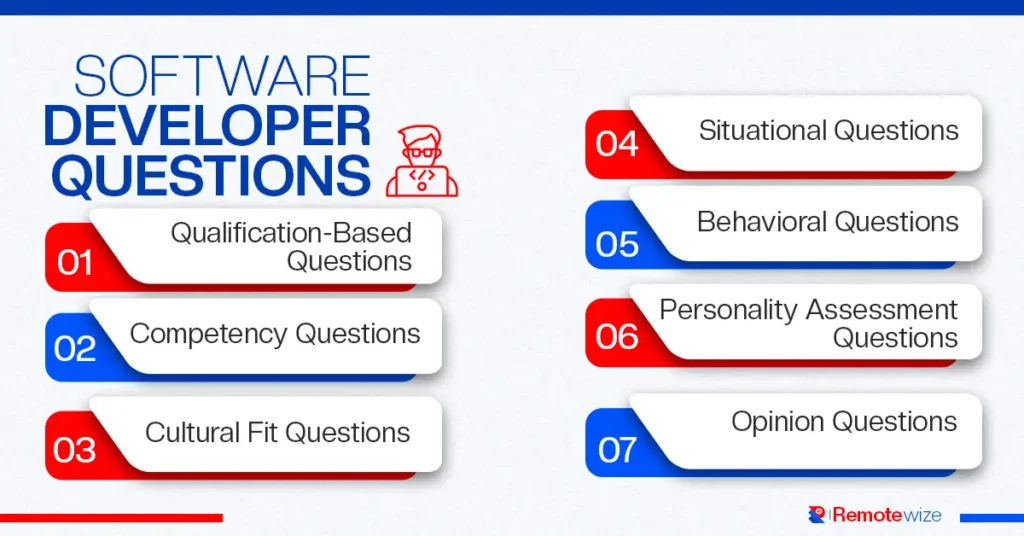
Top Software Developer Interview Questions
When hiring a software developer, look for someone with good, consummate soft and strong technical skills.
The right software developer interview questions can help you evaluate an applicant’s soft skills, hard skills, behavioral intelligence, and more.
To help you find the right candidate, here’s a list of questions you need to ask software developer interviewees.
Qualification-Based Software Developer Interview Questions
Most companies want candidates with higher qualifications. Qualification-based questions can help you decide just that.
They help you determine a candidate’s technical knowledge and expertise so you know whether they can handle the job’s requirements.
Here are three example questions you can ask your candidates:
1. What Programming Languages Do You Use? Which Three Do You Prefer Or Are Most Familiar With?
Believe it or not, it’s one of the most important interview questions for developers and can often be a dealbreaker for most recruiters. When you hire a software developer, find someone with good knowledge of a specific programming language.
Bonus if they use these languages for personal projects outside of work. This shows they actively work on their programming skills.
Some programming languages are more crucial than others, based on what your team or company works on. For example, if you want a candidate for web development, they should be proficient in CSS, HTML, and JavaScript.
2. How Do You Keep Your Skills Sharp and Up To Date?
This question indirectly checks if the applicant is focused on professional growth. In software engineering, it’s vital to keep up with new trends.
Ask how the applicant stays connected to the industry and stays informed. Make sure to look for:
- Specific steps your applicant has taken and why
- Signs that show the candidate is informed on industry trends
Don’t forget the best software engineers embrace continuous learning to stay ahead in this fast-evolving field.
3. How Do You Create Tests To Discover Bugs In An Application?
Testing for bugs is common for developers, as they appear while building software. Identifying bugs involves creating tests conducted at various development stages. This way, you’ll get a final product with zero error.
Good software developers can walk you through their way of working and why they think finding and testing bugs are important. You should know that every developer or software engineer has their ‘own’ process. So, listen carefully.
Competency Questions
Competency interview questions are prompts that help you gauge a candidate’s skills and technical know-how. Often, they’re open-ended and might require answers that involve real-life scenarios.
Listed below are a few questions to ask.
1. What Do You Think Are the Most Important Aspects to Pay Attention to When Reviewing Another Team Member’s Code?
This question will provide you with insights into how the candidate approaches both teamwork and coding.
It’s increasingly helpful when interviewing developers to try and comprehend their reasoning surrounding coding and collaborating with others since both are crucial for successful projects.
Although there’s no wrong or right answer to this query, here are a few pointers to look for:
- No repetition
- Readable, concise, clean, and instantly understandable code
- Consistent naming conventions
2. What Has Your Experience Been Like As Part of an Agile Software Development Process, If Any?
It’s crucial to check if the candidate is familiar with Agile development and has experience in Agile teams since many development teams use Agile. This approach promotes teamwork, adaptability, and iterative development, ensuring projects are delivered efficiently.
You should look for:
- Considerable experience in Agile software development
- Previous work in cross-functional teams using methodologies like Kanban and Scrum
3. Talk About A Project You Completed Successfully
This query will allow the developer to talk about a specific project they completed without going too technical.
It should provide insights into how they collaborated with teams, interacted with leaders and managers, time-management skills, and what contributions they specifically made. This helps you recruit a software engineer who best meets your company’s needs.
Cultural Fit Questions
While technical skills are important, you should also consider how a candidate can contribute to the company culture. Applicants who align better with your company’s culture and mission are more likely to be productive and engaged and won’t quit within a year.
Below are some cultural-fit questions you should ask your software development candidates.
1. Why Did You Decide To Become A Software Engineer?
This question helps you learn more about your candidate. It reveals what motivates a developer and what aspects of their work they’re truly passionate about. Their response will show whether they have a strong enthusiasm for software engineering.
2. What Are You Looking For In This Job?
Make sure to include this query in your software engineer interview questions. It can help gauge whether a candidate’s career goals match what your company looks for.
In addition, you’ll get to know what prompts them at work. This is important to keep your team thriving and happy in the long run. Listen for what makes this applicant tick and what things you can do to keep their stay longer and better. This could be anything like money, passion for work, or growth opportunities.
No matter what, you should listen without any judgment and understand their perspective.
3. Do You Enjoy Working With a Team or Alone?
There’s no definitive answer to this query, as it largely depends on what you’re looking for in a developer.
Maybe you want a developer who can be self-sufficient and work hard or someone flexible and open to different approaches. Nevertheless, you want a candidate that best meets your specific needs.
Situational Questions
Situational questions give candidates made-up situations and ask them to describe what they would do. These questions are great for interviewing software developers because they have to think fast.
When you ask situational software engineer technical interview questions, you want to see how candidates would solve a problem that might happen in your company.
Here are some examples to help you out:
1. How Would You Manage a Disagreement With the Team Lead?
No matter how much the team thrives, there will be disagreements – they’re inevitable. This doesn’t mean disagreements are bad.
Diverse teams and leaders bring various viewpoints and positive debates over products, often leading to new, enlightening solutions.
Ask your applicant to share a past example. This will show their peacekeeping and communication skills necessary for the software reengineer roles.
2. How Would You Handle a Problem If You Ran Into an Obstacle With Your Project?
This is one of the most important software developer interview questions you should ask your candidates. It helps identify how the applicant deals with delays, obstacles, and other issues that appear down the road.
Most projects experience hurdles of various sorts, so a software engineer or developer having trouble pinpointing obstacles in their past projects might be a concern.
When hiring a developer, ensure they can overcome issues to complete the assigned tasks on time.
3. If You Were Assigned Multiple Projects With Tight Deadlines, How Would You Cope With Competing Priorities?
At times, developers have to manage multiple priorities simultaneously. As a recruiter, you know how crucial proper and timely management of these tasks is for a company’s success.
The best applicants know how to determine their competing priorities and juggle without enabling one to mess up the others.
Notice if a candidate also tells you a personal story or an anecdote about how they handled several priorities.
Behavioral Questions
Behavioral questions prompt candidates to talk about past work experiences and how they managed situations. This helps predict their reactions in similar situations at your company.
You can also use behavioral questions to evaluate different skills and qualities. For example:
1. Can You Share a Time When You Worked With a Co-Worker on a Project and They Were Falling Behind Schedule? How Did You Manage the Situation?
Software development is an increasingly collaborative career option, even though a series of tasks will be carried out by individuals.
This career demands working with several clients and teams with different leadership styles and personalities to diagnose and fix various software issues.
Here’s what you should look for:
- Leadership qualities coupled with a proactive approach to meeting deadlines
- Focus on an applicant’s experience in problem-solving
- Use of communication and interpersonal skills to motivate and connect with others
2. Share a Time When You Had to Make a Big Decision During Production. What Went Down, and How Did You Deal With It?
This question can help determine whether an applicant can think independently, analyze and review things quickly and clearly, and understand the most logical connections between ideas.
Developers who are good at critical thinking tend to have a curious mindset, which can spark innovation and improve production systems and processes.
3. Think About The Toughest Piece Of Code You’ve Written. Can You Describe The Project And Explain Why It Was Challenging For You? Share What You Learned From The Experience.
Not every software project is a breeze. The best developers can spot their weaknesses and work on fixing them. If they can laugh off the challenges they’ve dealt with, it might mean they’re better at handling job stress.
Make sure to listen for:
- Admission of their weaknesses instead of just blaming external factors
- Signs that they use what they’ve learned to dodge similar issues in the future
- Experience in setting goals and sticking to a professional development plan.
Personality Assessment Questions
Personality assessment questions help you explore how candidates manage stress, stay motivated, and interact with the team.
Most recruiters use them to learn more about a candidate than their professional level. These questions help you understand whether a candidate matches your organization’s culture.
If multiple applicants have similar software development experience and skills, personality assessment queries can help you choose a better fit.
Let’s explore some examples:
1. Tell Me How You Handled a Situation When You Were Unfairly Blamed for the Error.
It can be a challenging query; however, it’s a perfect way to assess an applicant’s attitude to teamwork. If a candidate quickly shifts the blame on their colleagues, it’s a red flag. You should hire diplomatic developers who don’t get frustrated easily and work toward solutions.
2. What Work Environment Motivates You?
This software developer question helps determine if your company’s environment suits the candidate. Finding a culture-fit candidate is better than one with exceptional technical skills.
When hiring, make sure your assessment isn’t influenced by personal biases. Hire a software engineer with the right attitude so they can thrive in your workplace. A competent tech lead can enhance their project-specific skills and train them for success.
3. What’s the Project That You Are Most Proud of?
This query will show how the applicant feels when contributing to a certain goal or mission. Which specific goal they found most interesting and relatable?
Additionally, it will show what types of projects the applicant would love to work on. You can learn whether they’re a good fit for the company or the position you plan to hire them.
Opinion Questions
Opinion-based questions are different because there is no ‘single’ right answer. You can use opinionated questions to see where a candidate stands on issues in the workplace, industry trends, practices, values, or technologies.
They help you identify applicants who bring an informed and proactive mindset to your team.
Here’s what you can ask candidates.
1. If Your Co-workers Could Describe You In a Few Words, What Would They Be?
The words candidates use can tell a lot about them. This question allows you to get insights into how they see themselves and around their colleagues or teammates.
Make sure to listen for words like:
- Adaptable
- Organized
- Flexible
- Focused
- Innovative
- Determined.
In short, look for any adjective or word that best identifies the ideal applicant.
2. Do You Consider Unit Testing Important or a Waste of Time?
Every competent engineer or developer should know about unit testing. Asking about this will show their attitude and priority towards it.
Do they follow behavior-driven development (BDD) or test-driven development (TDD), or do they add unit tests later for process compliance or appearances?
Unit tests are considered a best practice in code maintenance and software development. They are crucial in preventing logic errors and coding flaws and stopping bugs from reaching the final product.
Moreover, automated unit tests also prevent regressions, ensuring that previously fixed bugs don’t resurface.
3. What, In Your Opinion, Is the Most Exciting Development In Software Development?
This fun developer interview question gives candidates space to talk about their interests in software development without focusing much on themselves.
The answer will point to areas the candidate finds interesting and how they can benefit and complement your existing team.
Ask the Right Questions to Get The Right Candidate
With this developer interview cheat sheet, hiring a software developer is a no-brainer. Navigate the must-ask technical software developer interview questions to determine the best fit for your company.
In addition to questions about technical skills, consider throwing some nice-to-ask interview questions for candidates, such as:
- How do you stay updated on industry trends?
- Can you share a time you completed a challenging project?
They help you identify whether an applicant is a cultural fit, adaptable, collaborative and may prove an asset to the company.
Follow this guide to create a comprehensive list of developer interview questions and reduce the time-to-hire in your tech interview process.
Want to make your technical hiring process easier?
Before jumping directly to the interview with your software developer questions, you should learn how to vet remote software developers to assess their skills beforehand and shorten the list of candidates.
Happy Hiring!
Software Developer Interview Questions: FAQs
What Are Common Coding Interview Questions?
Programming questions are a must in a developer interview. No matter which language your candidate is skilled in, ensure they’re familiar with the basic programming concepts.
Some common coding interview questions include:
– What is an Array?
– How to reverse a string in Java?
-What is a Data Structure?
– What is Recursion?
– How to implement bubble sort?
What Questions Are Asked In A Software Developer Interview?
Software developer interviews involve a range of questions from qualifications and competency to behavior and opinion-based that you can ask candidates. Here are a few questions to ask software engineers in an interview:
– What programming languages do you use?
– Why did you choose to be a software developer?
– Do you enjoy working alone or with a team?
– What project are you most proud of?
How Do You Structure A Developer Interview?
Without a structured interview, you may miss out on excellent technical talent. It could also make your hiring process costlier, and employees may not stay for long. Follow the steps to structure a software developer interview:
– Define job requirements
– Identify the right applicants for the interview
– Hold a phone screening interview to shorten the list of candidates further
– Evaluate your applicant’s skills with a technical interview and coding challenge
– Final interview

